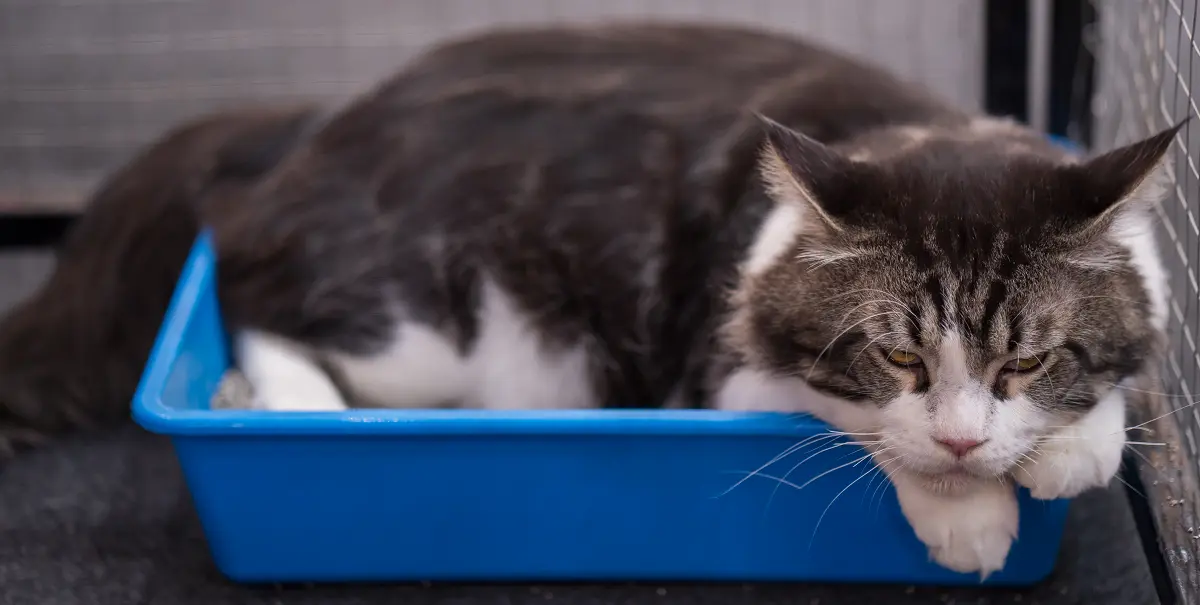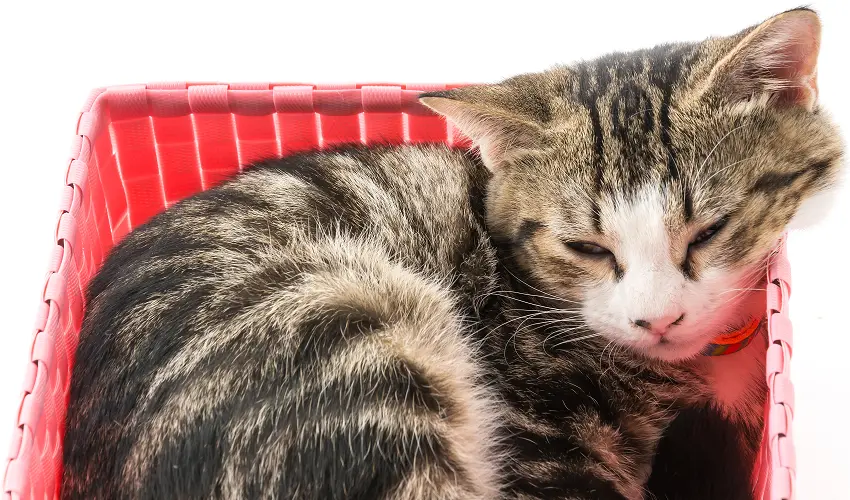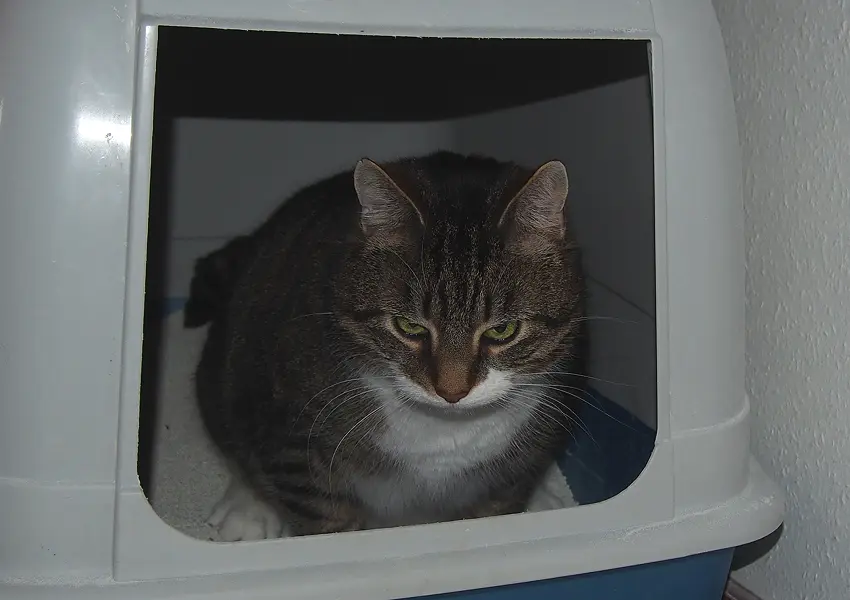Why Does My Cat Sleep In The Litter Box?
Why does my cat sleep in the litter box? Felines normally prefer sleeping on a spot far from their place of elimination. This is to avoid predators from detecting their scent. But if your kitty is sleeping in its litter box, something is not right. This happens to newly adopted cats that are used to sleeping near their litter box since they are contained in a small kennel. However, it could also be a more serious health problem like kidney disease.
Reasons why a cat will sleep on its litter box
If your cat is spending more time in its litter box during bedtime, the following might be the reasons why:


1. New home
Cats that are recently adopted will often seek shelter on the litter box. It’s the perfect hiding place because it’s small and somewhat mimics the feel of being in a rescue shelter kennel.
Rescue cats that have stayed in the shelter for long are so used to sleeping right beside their litter box. So when they arrive at a large home, they will feel overwhelmed. The kitty will then seek for the smell of a litter box. You just have to give the kitty some time to go out and acclimate to its new home.
Also, you should make your house calm and as predictable as possible. Try to limit anything that might spook the kitty.
2. Show of dominance
If you have multiple cats at home, one of your kitties may sleep on the litter box as a way of claiming it as a territory. Your cat is having a stakeout in the litter box to block other felines from entering and using it as a show of dominance.
However, you should also consider that it could be the other way around. Cats that are often bullied and harassed by other kitties at home will prefer to sleep in the litter box. This is so they can use it first even before the bullies arrive.
The easy solution here is setting up multiple litter boxes at home. This will prevent your cats from having to share the same box all the time.
3. Fear and stress
When cats are stressed, they will seek comfort in cramped spaces. This is rooted in their behavior in the wild where they hide in tiny spaces to evade predators.
Even if your cat is used to sleeping on a bed, it will start spending the night on the litter box if there’s a massive change in the household. It could be the arrival of a baby, the passing of a family member, or moving to a new home.
These changes will keep you busy, which, in turn, will reduce the time spent with your cat. Your kitty will try to exhibit weird behavior like sleeping in the litter box to get your attention.
If your cat is stressed or afraid, you should bring it to a quiet and calm room. This will help the cat simmer down so it won’t seek the comfort of the litter box.
4. Labor for pregnant cats
Pregnant cats with no comfortable space to give birth will seek shelter on the litter box. This is because the litter box offers privacy and seclusion, which prevents predators from smelling the newly born kittens.
If you have an expecting cat, it’s best to set up a whelping box with warm blankets and raised edges. You should also choose a quiet spot in your home to reduce the stress of the pregnant cat.
5. Kidney problems
On a more serious note, sleeping in the litter box may indicate kidney problems. Most kidney problems cause incontinence. This will make your cat insecure if it’s too far from the litter box. The cat will just decide to sleep in the box to rest while preventing accidents.
Aside from sleeping in the litter box, cats with kidney disease will have bad breath, changing appetite, unexplained weight loss, lethargy, and mouth ulcer. If you notice these symptoms, you should bring the cat to the vet’s clinic immediately.
Kidney disease is a life-threatening condition that needs immediate medical attention. While some cats with problematic kidneys will sleep in their litter box, others won’t. You should still watch out for other symptoms.
There are many culprits to kidney disease, but the most common is a bacterial or viral infection. This is followed by kidney stones, kidney blockage, and ingestion of toxic substances.
6. Feline dementia
If you have a super-senior cat, feline dementia might be to blame for the weird behavior. Cats with feline dementia are no longer cognitively sound so they may sleep in unlikely places – including the litter box.
Feline dementia usually has a slow onset so it doesn’t happen overnight. The symptoms would be mild and will worsen gradually.
One of the symptoms of cat dementia is disorientation. Your cat will forget the typical things like where its food is located and how to use the litter box. Also, the senior kitty will have unusual vocalizations and howling, especially in the middle of the night.
Unfortunately, cat dementia can’t be treated. Still, there are ways to improve the kitty’s life in its last years. The vet can also come up with a medical plan that will help slow down the condition.
Why is my cat sleeping in the litter box after surgery?
After surgery, your cat will be weak. It will also be painful to move just to reach the litter box. To save themselves from suffering, cats will sleep in the litter box so they can still eliminate anytime.
You would like to correct this behavior because the litter box is mired with germs. Your cat’s wound might get infected if it lies down directly on fecal matter.
It will help to place your cat’s bed near the litter box so it won’t have to spend the night sleeping on cold litter. Please read here: Why Does My Cat Sleep On My Pillow
Another possibility you should consider is whether your cat is still high in anesthesia. Like humans, cats that are still under the influence will exhibit weird behavior. Your kitty may sleep in the litter box, just like how you’ll find yourself slumped in the bathroom after a night of binge-drinking.
Why is my cat sitting in the litter box but not peeing?
If your cat is sitting in the litter box as if peeing but no urine is coming out, you have to get it checked immediately. This might be a case of a blocked urethra. It prevents the urine from flowing, which can be painful and life-threatening if not addressed as soon as possible.
Take note that blockage of the urethra can either be partial or full. In partial blockage, your cat can still pee, but in small amounts so it takes them longer to exit the litter box. Please read here: How To Find Cat Pee Accident Spots
Urethral obstruction in cats can be due to its diet, urethral edema, and urinary tract infection. All of these require medical attention.
Why is my new cat hiding in the litter box?

Arriving in a new home is stressful for cats. This is the reason why they may prefer to sleep anywhere but their beds. Since the litter box is cramped, it offers a sense of security for the newcomer. It’s also possible that your new cat is hiding from the resident feline out of fear.
A proper introduction is necessary to prevent this scenario. You should also put your cat in a small room so it won’t be overwhelmed by the size of your home.
Why is my cat playing with his poop?
Cats are feisty and mischievous beings so don’t be surprised if yours starts to play with its poop in the litter box. However, since cats are pretty clean, it might be puzzling why they will dare touch their own fecal matter.
Poop playing among felines isn’t that uncommon. Cats that don’t receive enough playtime and attention from their owners will look for ways to entertain themselves. It could be tossing a rodent they just caught or their own, fresh poop.
To stop this behavior, you should provide the kitty with enough physical and mental stimulation. You should supply your pet with interactive toys that will keep its mind away from playing with poop.
Conclusion
So why does my cat sleep in the litter box? For newly adopted felines, it’s fear and stress. However, it could also be due to kidney problems or feline dementia. Pregnant cats will also sleep in the litter box if they are already in labor. Whatever it is, it’s important to get to the root of the problem to solve it.
